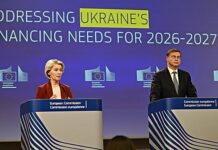By Euronews
Published on

ADVERTISEMENT
A peace settlement in Ukraine “will require compromises that not everyone will like”, former Austrian Chancellor Sebastian Kurz wrote in an exclusive op-ed for Euronews.
“This war produces no winners, only losers on both sides. Budapest offers the opportunity for a peace settlement that will enable both sides to break this impasse,” Kurz said. “The task of politics is to find solutions, not to manage conflicts,” he added.
The US and Russian presidents announced on Thursday that they plan to hold talks on Moscow’s war in Ukraine in Budapest, possibly in the coming weeks. The meeting would mark the first time since the start of the full-scale invasion that Vladimir Putin — a man under sanctions and an international arrest warrant — sets foot on European soil.
Ukrainian President Volodymyr Zelenskyy said on Monday that he would be ready to join Trump and Putin in Hungary to discuss ways to end the war, which has dragged on for more than three and a half years, if he were invited.
“If it is an invitation in a format where we meet as three or, as it’s called, shuttle diplomacy … then in one format or another, we will agree,” Zelenskyy told reporters earlier today.
However, the Ukrainian leader criticised the decision to hold the talks in Hungary — a country led by Hungarian Prime Minister Viktor Orbán, who has consistently urged his EU counterparts to negotiate with Moscow and opposed collective support for Kyiv.
In his article for Euronews, the former Austrian chancellor praised Hungary’s initiative to host the peace talks in its capital. “Hungary is creating the practical conditions for all sides to come to the table. This is pragmatic diplomacy,” he argued in his op-ed.
Kurz added that since Russia’s war of aggression is unfolding in Europe — and its consequences are being directly felt across the continent — it is logical for a peace solution to be brokered here as well.
EU leaders will meet Zelenskyy in Brussels on Thursday, where they are expected to reaffirm their “continued and unwavering support” for Ukraine’s independence and territorial integrity, while exploring new ways to strengthen military assistance to Ukraine, according to draft Council conclusions seen by Euronews.















